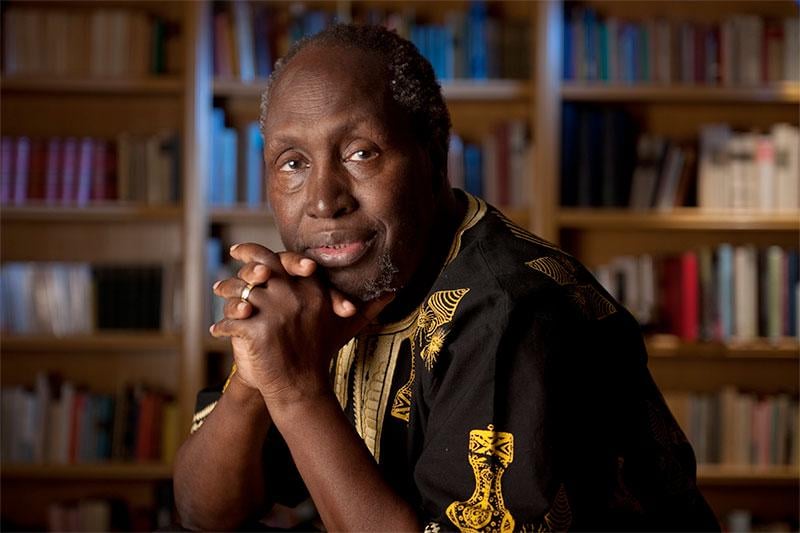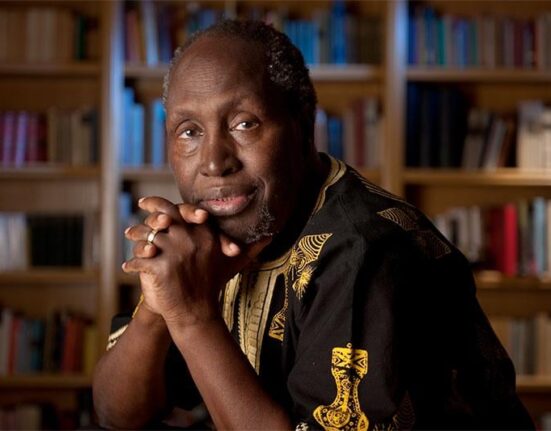Celebrated as a literary giant in African literature, Ngũgĩ wa Thiong’o leaves behind a profound legacy that transcends borders and generations. Born James Ngugi on January 5, 1938, in Kamiriithu, Kenya, he grew up immersed in the rich tapestry of his homeland’s culture and traditions. Educated at mission-run schools and later at prestigious institutions like Makerere University College in Uganda and the University of Leeds in England, Ngũgĩ wa Thiong’o’s journey was marked by a deep-rooted commitment to challenging colonial influences and embracing his Kenyan identity. This transformation is epitomized by his decision to change his name from James Ngugi to Ngũgĩ wa Thiong’o, a symbolic act of resistance against the legacy of colonialism.
Ngũgĩ wa Thiong’o’s literary career is a testament to his unwavering dedication to amplifying the voices of the African experience. Bursting onto the scene with the powerful performance of his play “The Black Hermit” in 1962, he quickly garnered acclaim for his novels such as “Weep Not, Child” (1964) and “The River Between” (1965). Through his works, he delved into the complex layers of colonialism, the Mau Mau Uprising, and Kenya’s struggle for independence, offering profound insights into the historical and cultural landscape of the continent. His writing not only captured the essence of Kenya’s past but also shed light on the challenges of post-independence nation-building and the imperative of decolonization.
Ngũgĩ wa Thiong’o’s oeuvre stands as a powerful testament to the resilience and spirit of the African people, echoing their struggles and triumphs through the written word.
A key hallmark of Ngũgĩ wa Thiong’o’s literary philosophy was his firm belief in the importance of African languages in literature. Writing primarily in his native Kikuyu language, he championed the preservation and celebration of indigenous languages as a means of reclaiming cultural heritage and fostering a sense of pride and identity among African communities. His works, translated into numerous languages, served as bridges connecting diverse audiences to the richness of African storytelling traditions. This commitment to linguistic diversity not only expanded the global reach of African literature but also highlighted the intrinsic value of linguistic diversity in shaping narratives and fostering cross-cultural understanding.
Ngũgĩ wa Thiong’o’s advocacy for African languages continues to inspire a new generation of writers to embrace their linguistic heritage and amplify marginalized voices in the literary world.
Beyond his literary contributions, Ngũgĩ wa Thiong’o’s life was marked by a steadfast commitment to political activism and social justice. His outspoken critiques of oppressive regimes led to his imprisonment in Kenya, a testament to his unwavering dedication to speaking truth to power. Forced into exile in England and later the United States, he continued to be a vocal critic of colonialism and a staunch advocate for African self-determination. As a professor of literature, Ngũgĩ wa Thiong’o inspired countless students with his impassioned teachings, instilling in them a sense of social responsibility and the power of literature to effect meaningful change in society.
Ngũgĩ wa Thiong’o’s legacy extends beyond his literary achievements, encompassing his role as a fearless activist and intellectual who fearlessly confronted injustice and oppression.
Among Ngũgĩ wa Thiong’o’s notable works are masterpieces like “A Grain of Wheat” (1967), “Petals of Blood” (1977), “Devil on the Cross” (1982), and “Decolonizing the Mind: The Politics of Language in African Literature” (1986). Each of these works represents a profound exploration of the human experience, delving into themes of power, identity, and resistance with unparalleled depth and nuance. One of his most acclaimed works, “Wizard of the Crow” (2006), stands as a towering achievement in African literature, showcasing his unparalleled storytelling prowess and sharp social commentary. Additionally, his short story “The Upright Revolution: Or Why Humans Walk Upright” (2019) holds the distinction of being the most translated short story in the history of African writing, a testament to the enduring relevance and universal appeal of his narratives.
Ngũgĩ wa Thiong’o’s literary legacy serves as a beacon of inspiration for aspiring writers and scholars, illustrating the transformative power of storytelling to illuminate the human condition and provoke critical reflection on the world around us.
As news of Ngũgĩ wa Thiong’o’s passing reverberates across the literary world, tributes pour in from admirers and scholars alike, reflecting on the profound impact of his work on generations of readers. His enduring legacy as one of Africa’s most celebrated artists cements his status as a cultural icon whose influence transcends borders and time. Through his writings, activism, and unwavering commitment to social change, Ngũgĩ wa Thiong’o leaves behind a legacy that will continue to inspire and resonate with audiences for years to come. In honoring his memory, we pay tribute to a visionary artist whose words ignited imaginations, challenged conventions, and spoke truth to power.
Ngũgĩ wa Thiong’o’s legacy is a testament to the enduring power of literature to shape our understanding of the world and ignite the flames of social transformation.









Leave feedback about this